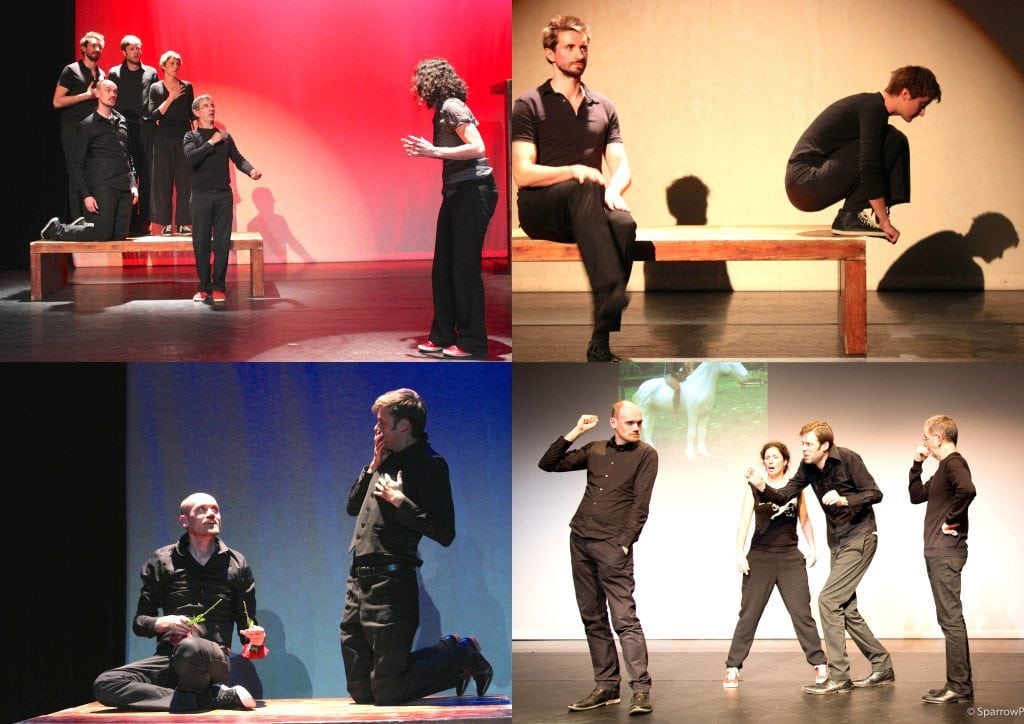"Surely that's not entirely improvised!"
"I suppose you have a set plot and vary around that according to what the audience brings to the table? It can't really be improvisation, can it? What is the system?"
This is one of the many versions in which after an improvisational theater performance, people sometimes come to find out if their suspicions are correct. They then can't believe that improvisation really took place and spent the entire performance looking for tactics and tricks. When you then explain that that is really not the case, and tell them what qualities are being trained on, often their appreciation for what they just got to see increases exponentially.
Improvisational theater = improvisation + theater
We experience that as a compliment, of course, because it is often because the result was so punishing that they cannot believe it was improvisational theater. Then when we discuss it with them it becomes equally apparent how absurd it would be should they be right. Playing staged theater and making it look like improvisational theater seems very difficult to us. As if to sell a good loaf of bread you would choose to make it with tomatoes as a base instead of flour. Or with spinach in our case.
And what is unfortunate for the Unbelieving Thomases on duty is that they missed part of the viewing experience during the performance. After all, when you watch improvisational theater, you get to see two things: theater and improvisation. Improvisation points to the unplanned. Improvisers demonstrate the art of the un-for-seen, which is what the word literally means in Latin: im-pro-viso.

Some improv trainers claim that in good improv theater, it no longer matters that it is improvised. That a spectator should not even be allowed to see the difference. We disagree. That would also make a mockery of theater that is scripted, staged, directed and rehearsed. After all, tons of craftsmanship goes into perfectly matching the theatrical elements with exactly what the director or company wants to say.
When creation and execution coincide
Of course, there is a (big) common ground. Characters and their emotions must be believable, the way space is taken must add value to the story, a sense of timing provides the dynamics of tension and relaxation, ... And that's what improv actors need to train themselves in.
But it's not the same thing. The specific art of improvisational theater is to allow the making and the performing to coincide completely. This does not mean that the process disappears, but that you can observe the process on the spot. As a spectator, with your input from the audience, you also become part of it. That is why improvisational theater of TIM Theatere also as powerful as "corporate theater." Not just HR employees or managers determine what it is about, every employee can see their voice interpreted.
So the process is a big part of the product! And that's pretty magical. You get to witness how players:
- picking up everything that presents itself, without judgment and with sharpened senses
- jumping into the not-knowing
- seeing opportunities rather than obstacles
- Be able to both lead in a crystal clear manner
- as the next moment follow the other without hesitation
- can let go of their plans and ego
- not worry about "mistakes" of the other and stay in cocreation mode
- daring to follow their physical impulses
- giving hands and feet to trust, freedom and connection
- have a great deal of fun playing together
Improvisation is also a life skill, and you can learn it
This set of qualities constitutes a whole performing art in itself, and also an art of living. That is why there are people who come back after a performance and say: "Not only the what, but also the how was so interesting to see. How you do it with each other is admirable. It would benefit every team to work together more like that. Where can I learn that?"
you can definitely benefit from improvisation training and you can go to our courses:
For performing arts, see our Spinach-Wisper offerings.
For the art of living, see the offerings of Living Impro.
Or get in touch for in-company trainings. Also, our specific trainings on feedback, presentation techniques, storytelling, communication, collaboration, cocreation or leadership are mainly built on improvisation principles.

Training in improvisational theater: an answer in a VUCA world
Improvisational theater training is increasingly being used worldwide to practice generic workplace skills at all levels. Not surprising in a world that today is increasingly referred to as VUCA: Volatile, Uncertain, Complex, Ambiguous. Renowned American training institutes such as MIT and Stanford University are major leaders in this field. Domestically, Vlerick and Inspinazie joined forces a few years ago to spread the improv microbe in business schools, with success.
Below are some more illustrative training organizations where we regularly conduct improv training.
- "Improvisational wisdom for mediators," for Mediation Institute Flanders (Mediv) as a two-day continuing education course and as a session in the basic mediation course
- "Communicating Authentically and Powerfully," for academic and non-academic staff within the training program of the KU Leuven
- "Living Impro. The Power of Pure Improvisation." For therapists, teachers and other facilitators in the program of The Undercurrent
- "Improving connectivity - creating playful learning journeys in the classroom" for teaching staff of Vlerick Business School, i.c.w. professor Ralf Wetzel
- "Strong at work, with improvisational wisdom" for Kwadraet
- ...
Come train with us. Improvisation = mindfulness & playfulness in human interactions!

